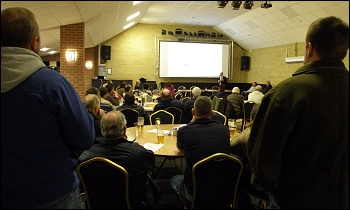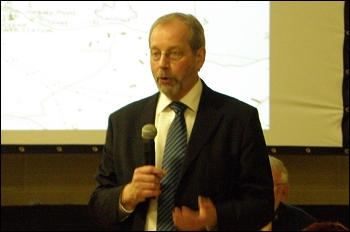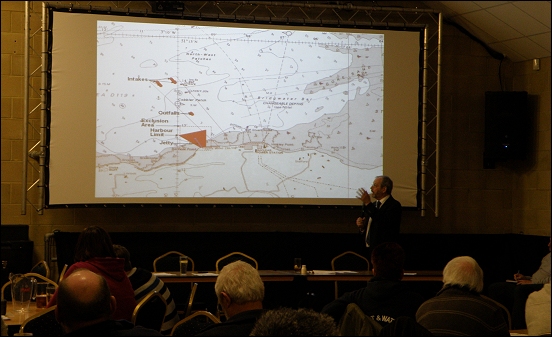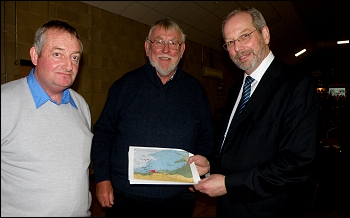Power firm EDF has not carried out any studies on the numbers of fish likely to be affected by the installation of Hinkley Point C’s new water in-take and out-take pipes in the Bristol Channel near Burnham-On-Sea, it emerged during a special meeting with local anglers on Thursday night (February 16th).
The matter was raised during an event attended by over 100 fishermen and boat owners from across the Burnham area, held to give them an opportunity to air their concerns on EDF’s expansion of Hinkley Point.
During the meeting at the Oaktree Arena, Pete Nicholson, Chairman of Burnham Water Users Forum – which represents local anglers and boat users – asked EDF’s Construction Project Advisor, Hugh Hutton, why the planned water out-takes and in-takes for the power plant would be “located in the middle of the best fishing grounds in the whole channel.”
He asked: “Given the location, do you have any data about fish stocks that would be affected?”
 Mr Hutton responded: “We have carried out studies on marine life living on the sea bottom there, but I don’t have information about fish stocks that could be affected.”
Mr Hutton responded: “We have carried out studies on marine life living on the sea bottom there, but I don’t have information about fish stocks that could be affected.”
“Your point has been noted and if we have missed anything we can only apologise and ask you to raise the matter with the Infrastructure Planning Commission.”
Burnham boat angler Chris Evans added: “We first brought up these points about the locations of the water in and out-takes two years ago and EDF assured us at the time that our concerns would be noted, but they haven’t acted upon them. It seems as though EDF is just trying to ride over us.”
And Boat owner Dave Saunders added: “It’s ridiculous that this was documented two years ago and nothing has been done.”
However, Mr Hutton said the in-takes and out-takes would need at least six metres of sea water to operate correctly and that building them further out into the channel would add “substantial cost” to the project.
He also tried to reassure the anglers that a number of measures would be taken by EDF to ensure the impact on fish stocks is minimal. “A 5mm wide mesh will go over the water in-take to prevent fish being pulled into the cooling system and we’ll also be using acoustic fish deterrence measures to deter fish from the immediate area.”
He also tried to dampen concerns about fishing restrictions in the area. “Health and safety restrictions will be in place around our proposed new jetty during the development phase, but they will only be in place while construction work is underway. We will try to minimise those times.”
 During the meeting, EDF answered a number questions on wide-ranging topics including radioactivity, sediments, the impact on Combwich, and sea temperatures.
During the meeting, EDF answered a number questions on wide-ranging topics including radioactivity, sediments, the impact on Combwich, and sea temperatures.
When asked whether the water effluent coming out of the cooling out-takes in the Bristol Channel would be radioactive, Mr Hutton responded: “Some discharges will have very low levels of radioactivity, but these will be very closely monitored and be tightly regulated so there is no need for concern.”
Speaking after the meeting, Simon Stroud, Chairman of Burnham Boat Owners Association, said he was pleased with how the meeting had gone. He told Burnham-On-Sea.com: “I think it was a very useful meeting. We were really pleased that over 100 people attended. There are still some outstanding questions that need to be addressed, such as the point about fish stocks, but I think it was positive.”
And EDF’s David Eccles added: “We addressed many of the concerns raised and have tried to reassure the water users that our plans will have little or minimal impact on them.”

Pictured: Top, the audience listening to the meeting; EDF’s Hugh Hutton with Simon Stroud, Chairman of Burnham Boat Owners Association, and President John May; and, above, EDF using a chart to show the area of the Bristol Channel near Burnham impacted by the Hinkley Point work







